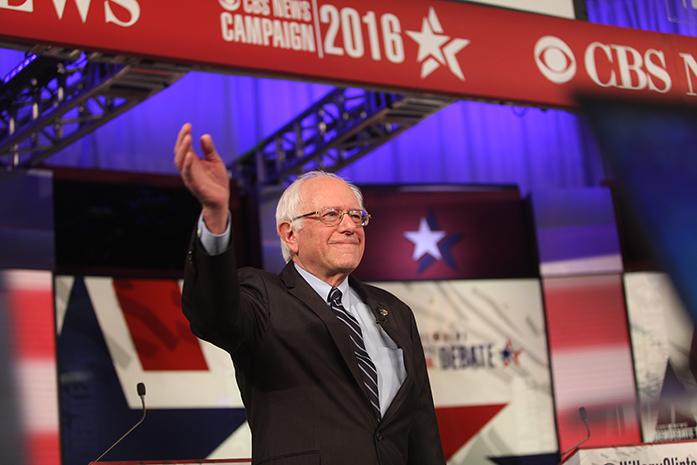Sen. Bernie Sanders looks to broaden his coalition during a weekend swing through Iowa.
By Brent Griffiths
Perhaps no moment better summed up Sen. Bernie Sanders’s campaign than what transpired in Phoenix over the summer.
The audience, an annual gathering of progressives called Netroots Nation, seemed primed for the septuagenarian Vermonter’s brand of politics.
Black Lives Matter protesters had already taken the stage and interrupted former Maryland Gov. Martin O’Malley calling on him to say the names of Rekia Boyd, Tanesha Anderson, and Sandra Bland, unarmed black women who were killed by police officers or died in custody.
Taking the stage after the governor, Sanders launched into his typical stump speech consisting of raising the minimum wage and Wall Street corruption before the protestors spoke up again. Then he considered leaving.
“If you don’t want me to be here, that is OK; I don’t want to out-scream people,” Sanders said to the audience and moderator Jose Antonio Vargas.
Afterwards, the confrontations led national broadcast and scores of writers critiqued how the two Democratic candidates responded.
Much has changed since then.
Sanders hired a black organizer as his press secretary. He privately met with protesters and activists to talk Black Lives Matter, said Sandra Bland’s name on national TV during the first Democratic debate, stumped with rapper Killer Mike in Atlanta, and toured the Baltimore neighborhood of Freddie Gray.
Over the weekend in Iowa, Sanders continued to test the narrative that his coalition will falter when the contest moves beyond Iowa and New Hampshire, two states with pushing near 90 percent non-Latino white population. The campaign held a racial-justice forum on Dec. 12 in Anamosa, in which one of the state’s prisons is located, and a Waterloo town meeting later that night. Per capita, Waterloo is home to Iowa’s largest share of African Americans.
Ohio state Sen. Nina Turner joined Sanders in Anamosa and was just a table away from everything unfolded at Netroots Nation this summer.
“I believe that the senator has grown, but there’s a however for that, fighting for civil rights is in his DNA,” Turner said in an interview with The Daily Iowan. “For him, that moment threw him off, but he was able to be able communicate with the Black Lives Matter folks and I do believe it made for a more robust racial justice plan.”
A one-time Ready for Hillary super PAC supporter, Turner — who emphasizes that she never endorsed Clinton — publically backed Sanders just before the second Democratic presidential debate in Des Moines.
The difficulties of attracting people of color to the caucuses were on full display at forum on racial justice and prison reform. About 300 people crunched inside a cozy elementary school. But besides the campaign speakers and panelists, only a handful of persons of color were seated amid a vast white audience.
Cornell College sophomore Althea Greer was one of only two persons of color to pose a question to Sanders, who was joined by Turner and two former inmates.
Greer said Sanders focus on racial issues is another example of how running for president is a “learning process.”
While Iowa is a predominately white state, Democrats shattered turnout records in their last contested caucuses, in 2008, and according to research by Drake political-science Professor Dennis Goldford, black caucus-goers surpassed their percentage of the state’s population.
Nationally according to the U.S. Census Bureau, blacks voted at a higher rate in the 2012 presidential election than non-Latino whites for the first time since at least 1996.
All three campaigns have reached out to Rep. Ako Abdul-Samad, D-Des Moines and other members of the state party’s black caucus. He said approaching issues like those brought up by Black Lives Matter protesters can be a learning process, but one thing is for certain: Their concerns will continue to be at the forefront.
“Now, the candidates have to connect they can’t ignore this anymore,” Abdul-Samad said. “They can’t ignore DREAM act or racial disparities in policing or sentencing, because society and actions by those in it have brought that out to the forefront.”



